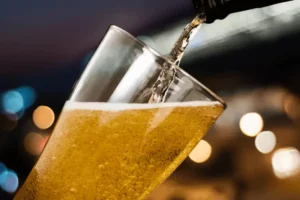Does Alcohol Make You Gain Weight? 5 Ways It Sabotages Weight Loss

Thus, accounting for both sides of the energy balance equation (intake, expenditure and lifestyle habits) is crucial to evaluate adequately the association between alcohol intake and obesity. Overall, the available experimental evidence reviewed in this article suggests that moderate intake of alcohol does not lead to weight gain. The systematic review by Bendsen et al. [3•] suggests that this trend is less likely in experimental studies examining beer consumption exclusively. A modest increase in weight of one kilogram over a 10 week period seems insignificant but over five years this could result in up to 26 kg of weight gain if no compensation takes place. A summary of the studies examined in this article, organized by the trend between alcohol and weight gain/obesity can be found in Table 1. Additionally, drinking alcohol negatively impacts your metabolism and body’s ability to burn fat, contributing to weight gain.
- One explanation is that there is a learned association between alcohol and eating; however, several experimenters disguised the presence of alcohol in their protocols and still found increased energy intake [5].
- The morning after a night of over-imbibing can cause some temporary effects on your brain.
- However, drinking too much wine appears to outweigh any possible benefits and contributes excess calories in the process (11).
- This is because alcohol activates starvation mode in the brain, which is why you may suddenly catch yourself eating an entire bag of Doritos after a long night out as if your life depended on it.
- Several studies have found no association or a negative association between alcohol intake and changes in weight, BMI or other measures of adiposity [12, 30, 32–39].
Other Ways Alcohol Can Affect Your Body
- Also use intermittent fasting combined with C8-MCTs to promote additional fat-burning.
- Instead, changing your drinking habits can help you manage your weight.
When you mix drinks with sugary sodas or juices, those calorie counts can soar. The amount you drink matters too—more drinks mean more calories, which can add up to temporary weight gain. Alcohol does not cause weight gain the same way eating a donut does. It impacts our decision-making, lowers our metabolism, produces additional stress, and traps us in an unhealthy cycle of binge eating and lounging. If you’re trying to lose weight, it turns out one of the BEST things you can do is stop drinking alcohol.
Alcohol can affect your organs
- “I prefer to drink my calories,” he told us, pointing to the bottle of red wine he had ordered. This he did—by consuming the entire bottle.
- While you do not have to entirely cut out alcohol, you may need to consume it more mindfully.
- If you’ve noticed you’ve gained weight or tend to bloat when you drink alcohol, you may want to consider cutting back on your alcohol consumption.
- Finally, recommendations for future research are provided to promote a better understanding of the possible obesity-promoting effects of energy intake from alcohol.
Alcohol consumption isn’t as black and white for weight loss and weight gain. Sure, alcohol contains empty calories, but how your body metabolizes it, your food choices, and the sleep you get to make the most significant impact. This can cause you to feel tired and groggy the next day, leading to increases in stomach fat. If you’ve ever been even a little hungover, you know how challenging it is to exercise the next day. Lack of exercising can keep you from burning off those alcoholic calories and eat bad foods the night before. If you’re doing everything else right in your diet and exercise program, then having an alcoholic beverage or two shouldn’t contribute much to weight gain.

Ultra-Processed Food and Depression: An Unsurprising Link
Eliminating or reducing alcohol consumption is a common dieting behavior. Less well known, and indeed potentially harmful to the health of the dieter, is eliminating food almost entirely in order to consume alcohol. According to the National Eating Disorders Association, some individuals may suffer both from anorexia and an alcohol use disorder. They often drink rather than eat, believing that alcohol consumption will suppress their appetite. Moreover, in order to compensate for the calories ingested from alcohol, these individuals will starve themselves. When you drink alcohol, it’s broken down into acetate (basically vinegar), which the body will burn before any other calorie you’ve consumed or stored, including fat or even sugar.

Avoid Drinks High in Sugars and Calories
Many mixed drinks include juices, simple syrup, or liqueur, which add extra calories quickly. Look for lower calorie options, such as a splash of juice and soda water. You may want to skip mixed drinks completely and stick with beer or wine. In reality, there’s no evidence that drinking beer (or your alcoholic beverages of choice) actually contributes to belly fat. The study showed that when mice were given doses of ethanol, they increased their food intake over time.
However, drinking too much wine appears to outweigh any possible benefits and contributes excess calories in the process (11). Still, you may have heard that red wine, in particular, may offer more benefits than other alcohols. Red wine contains resveratrol, an antioxidant compound that may fight disease and has been linked to heart benefits when consumed in moderation (10). Most of the calories in wine come from alcohol and various amounts of carbs.
Best alcoholic drinks for weight loss
Within the large body of observational research, contradictory findings exist, which warrant further exploration [3•, 4]. While cutting alcohol completely out of your diet isn’t necessarily the only way to lose weight, there are many improvements that can be made in your health journey by simply cutting back on the booze. Changes in the way your body stores energy from food can make it very difficult does alcohol make u gain weight to lose weight. Still, these factors do contribute to a longer-term connection between alcohol and weight gain. While water retention, bloating, and digestive issues are the primary culprits of (seemingly) overnight weight gain, there are other factors that exacerbate those hangover pounds. You may already be aware of some of the more unsavory side effects of alcohol, especially when you overdo it.

How alcohol links to weight gain
This may all sound as if alcohol is ruining your chances of that beach body. But fear not — watching your weight doesn’t necessarily mean having to cut alcohol entirely out of your diet. Digestive secretions are an essential element of healthy digestion. They break down food into the basic macro- and micronutrients that are absorbed and used by the body. Sleep deprivation, whether from lack of sleep or impaired sleep, can lead to an imbalance in the hormones related to hunger, satiety, and energy storage. Plus, lower testosterone levels may affect quality of sleep, especially in older men.









